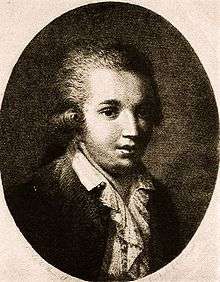La finta parigina
| La finta parigina | |
|---|---|
| Opera buffa by Domenico Cimarosa | |
 The composer | |
| Librettist | Francesco Cerlone |
| Language | Italian |
| Premiere |
1773 Teatro Nuovo, Naples |
La finta parigina is an opera buffa by Domenico Cimarosa with a mostly Italian (there is also some French) libretto by Francesco Cerlone. The opera premiered at the Teatro Nuovo in Naples, in 1773.[1]
Historical background and analysis
La finta parigina was composed for Carnival of 1773 and, although the exact date of the works premier is now unknown, it was performed during Carnival of that year. It is the second of the sixty-eight operas that Cimarosa wrote and is written in the then popular style of comic Neapolitan opera. This style of comedy relies heavily upon character acting which is often zany and eccentric. Cerlone's libretto is filled with puns and other linguistic gags. The dialect of the opera was also written with a comic affectation that would have been highly amusing to the opera's original audience. Cimarosa's music also emphasizes the comic nature of the language and plot. For example, he constructs a mock duel scene via instrumentally accompanied recitative, its cantabile lines gradually developing into an ensemble. The opera was well received on its premier and is still infrequently revived today.[2]
Roles
| Role | Voice type | Premiere Cast, Carnival 1773 (Conductor: - ) |
|---|---|---|
| Donna Olimpia Onesti, Don Martino's wife who is supposedly dead | soprano | |
| Don Flaminio del Sole, a local dandy | tenor | |
| Mossiù Le Blò, a French doctor who is really a quack | tenor | |
| Don Martino Crespa, Donna Olimpia's supposedly widowed husband | baritone | |
| Donna Armida Gnoccolosa, engaged to Don Martino | soprano | |
| Cardillo, an innkeeper | baritone | |
| Malacarne, brother of Cardillo | bass | |
| Preziosa, a purveyor of cheese | soprano | |
| Rosolina, Cardillo's young sister | soubrette | |
Recordings
- La finta parigina with conductor Danilo Lombardini and the Orchestra Filarmonica Siciliana. Cast includes: Alessia Sparacio (Armida), Juan Gambina (Flaminio), Nunzio Galli (Le Blò), Alessandro Battiato (Martino), Anna Rita Gemmabella (Olimpia), Rosita Ramini (Preziosa), Alice Sunseri (Rosolina), Paolo Cutolo (Cardillo), and Giovanni Bellavia (Malacarne). Released on the Bongiovanni label in 1999.